
Pet Ducks: The Ultimate Guide to Keeping and Caring for Them
Last updated on January 18th, 2026 at 03:01 pm
Welcome to the world of duck ownership! Ducks are charming, intelligent, and delightful companions. Whether you’re considering bringing home your first ducks or looking to expand your flock, this guide will provide you with the knowledge and tools you need to ensure a happy and fulfilling life for your feathered friends.
Understanding the difference between pet ducks and regular backyard flocks is crucial. While many people keep ducks in backyard flocks for various reasons, pet ducks require a different level of care and attention. Pet ducks often have closer interactions with their human caregivers and may have different housing and enrichment needs than those kept primarily for egg production or pest control.
It’s essential to understand that pet ducks are not low-maintenance pets. They require daily care, attention, and a long-term commitment. By bringing a duck into your life, you’re taking on the responsibility of meeting their physical, emotional, and social needs for the duration of their lives.
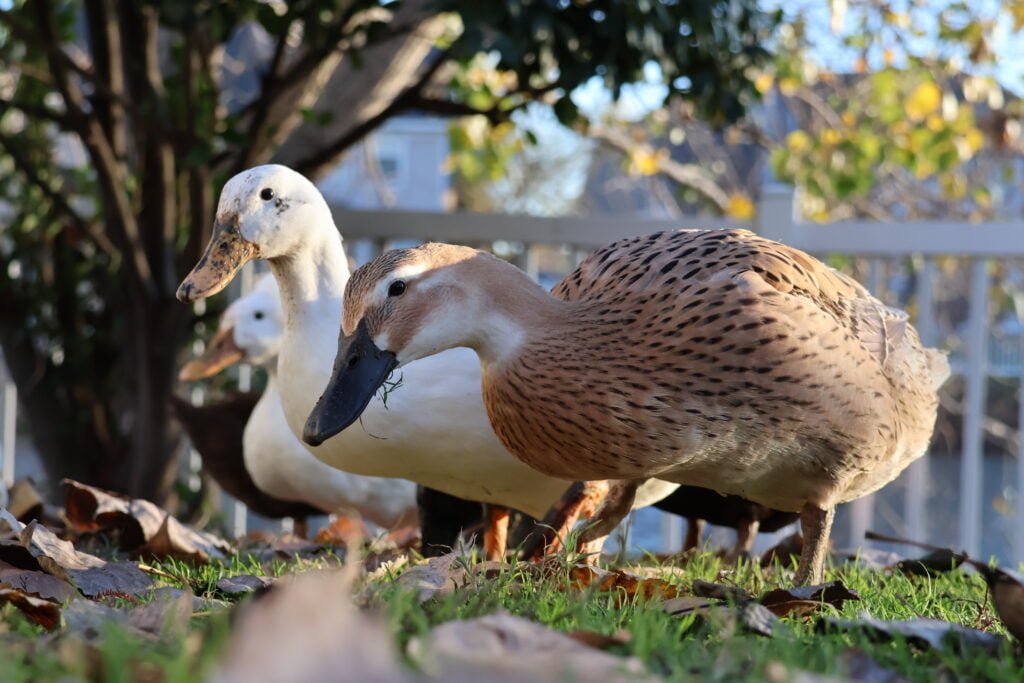
Disclaimer: I may earn a commission if you buy products or services through my affiliate links. This will not affect the price you pay. I only recommend products or services that I believe will be beneficial to my readers.
General Duck Care Requirements
Understanding the basic needs of pet ducks is fundamental to providing a happy and healthy life for your feathered companions. Ducks require access to clean water for drinking and bathing, appropriate nutrition, adequate shelter from the elements and predators, and opportunities for exercise and mental stimulation.
Ducks should have access to a secure and comfortable shelter to protect them from extreme weather conditions and predators. This could include a well-ventilated coop or shelter.
Additionally, ducks need a balanced diet consisting of commercial duck feed supplemented with fresh vegetables, fruits, and grains and access to clean, fresh water at all times.
Regular health check-ups and monitoring are crucial for ensuring your ducks’ well-being. Monitor your ducks for signs of illness or injury regularly, such as changes in behavior, appetite, or droppings. Schedule regular check-ups with an avian veterinarian to ensure your ducks receive appropriate vaccinations, parasite control, and medical care.
Choosing the Right Food for Your Pet Ducks
Providing your ducks with a balanced diet is essential for their overall health and well-being. A diet consisting of high-quality commercial duck feed, supplemented with fresh fruits, vegetables, and grains, will ensure that your ducks receive the necessary nutrients to thrive.
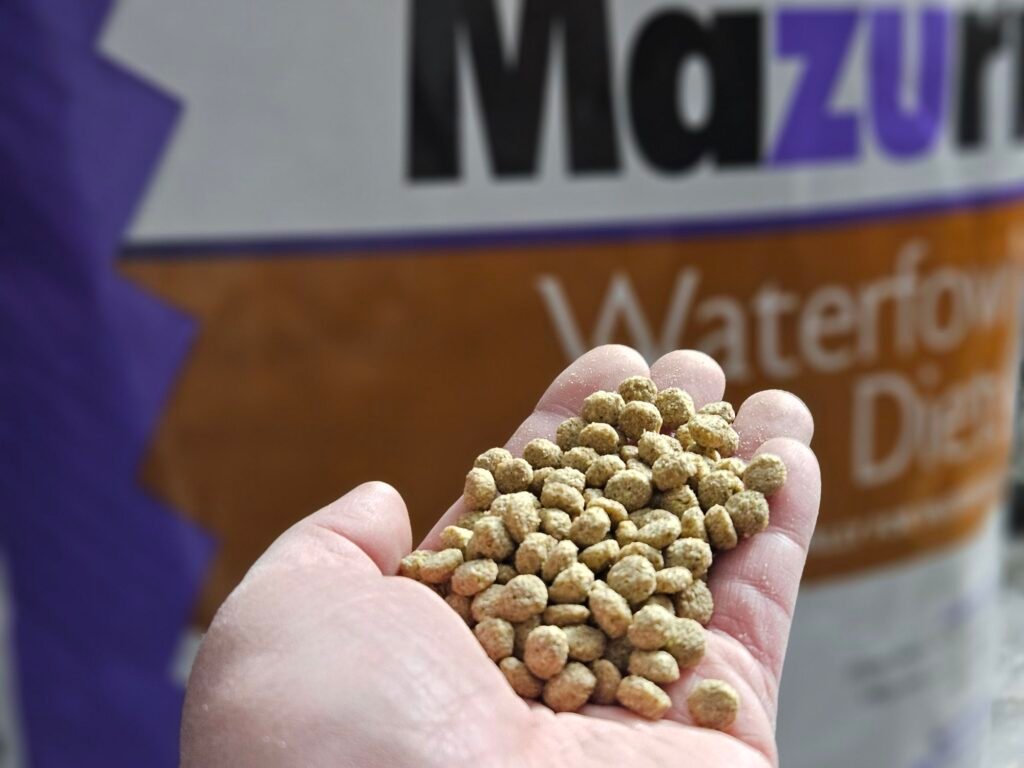
Avoid feeding your ducks foods high in salt, sugar, or additives, as these can harm their health. There are many types of feed suitable for pet ducks. Commercial duck feed is specifically formulated to meet the nutritional needs of ducks at different life stages. Choose a feed that is appropriate for your ducks’ age and activity level, whether they are ducklings, adult ducks, or laying hens.
You can also supplement their diet with leafy greens and other healthy treats to provide variety and enrichment. Supplementing with treats and foraging opportunities can provide mental stimulation and enrichment for your ducks.
In addition to their regular diet, ducks enjoy foraging for insects, worms, and vegetation as part of their natural behavior. Providing opportunities for your ducks to forage in a safe and supervised environment will help keep them mentally stimulated and engaged.
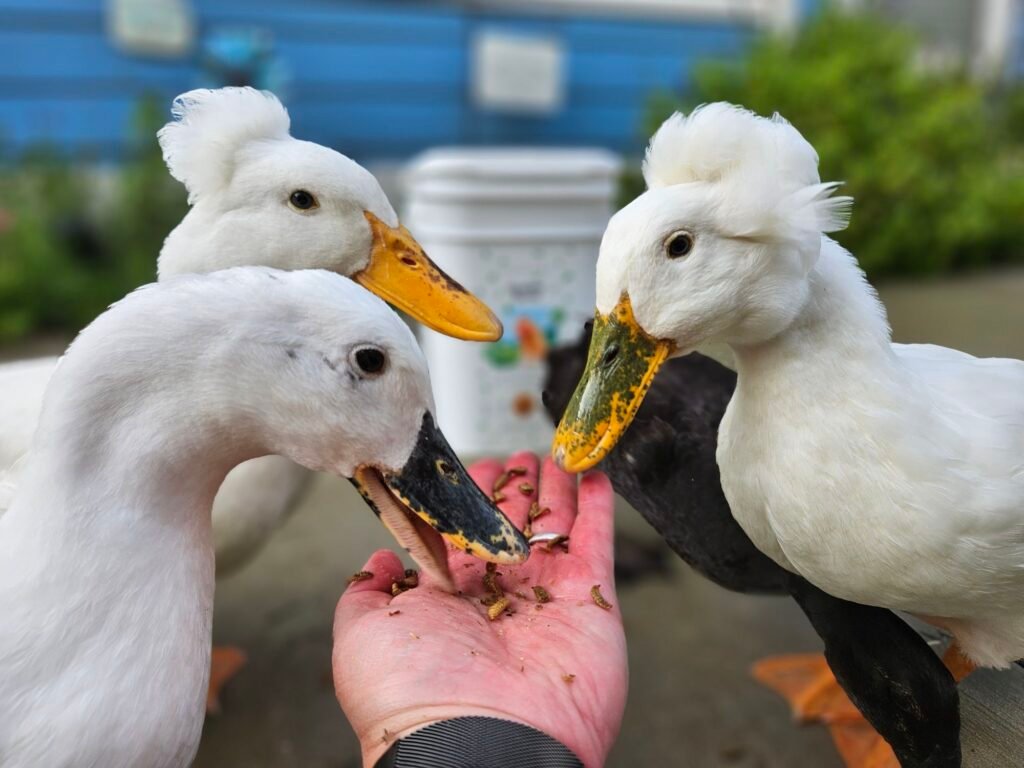
You can also offer occasional treats such as mealworms, cracked corn, or chopped vegetables as rewards for good behavior or as a form of enrichment.
Read more about this topic in our related posts:
- Essential Nutritional Needs of Ducks: A Complete Overview
- The Ultimate Guide to Healthy Duck Snacks: Treats Your Ducks Will Love
- Pet Duck Food: A Guide to a Healthy and Nutritious Pet Duck Diet
Predator-Proof Housing for Pet Ducks
Protecting your ducks from predators is essential for their safety and well-being. Ducks are vulnerable to predation from various animals, including raccoons, foxes, dogs, and birds of prey.
To protect your ducks from predators, provide them with a secure and predator-proof housing structure. This could include a sturdy coop or duck house with a solid floor, tight-fitting doors and windows, and hardware cloth or welded wire mesh to prevent predators’ entry.

In addition to securing housing, you can take several measures to minimize your ducks’ predation risk. Install fencing or electric netting around their outdoor enclosure, use motion-activated lights or alarms to deter nocturnal predators, and supervise them during free range time to intervene in case of danger.
Creating a safe outdoor environment for free-ranging ducks is also essential. If you allow your ducks to free-range during the day, remove potential hazards such as toxic plants, sharp objects, or bodies of water deep enough to pose a drowning risk. Provide hiding spots like bushes or shrubs to help ducks feel secure and avoid predators.
Learn more about this topic in our related posts:
- How to keep ducks safe from predators?
- 17 Duck Predators – Common And Not-So-Common Ones
- Super Easy DIY Duck House
- Building a Hoop Coop for Ducks with Cattle Panels
The Importance of Enrichment and Toys for Pet Ducks
Mental stimulation and enrichment are essential for keeping your ducks happy and healthy. Ducks are intelligent and curious animals that thrive on mental stimulation and enrichment.
Providing them with toys, puzzles, snuffle mats, and other forms of enrichment can help prevent boredom, reduce stress, and promote natural behaviors such as foraging and exploring. There are many simple and inexpensive ways to provide enrichment for your ducks. Scatter scratch grains or mealworms in the grass or their snuffle mat for them to forage, hang vegetables or fruits from a string for them to peck at, or provide floating toys in their water for them to play with.
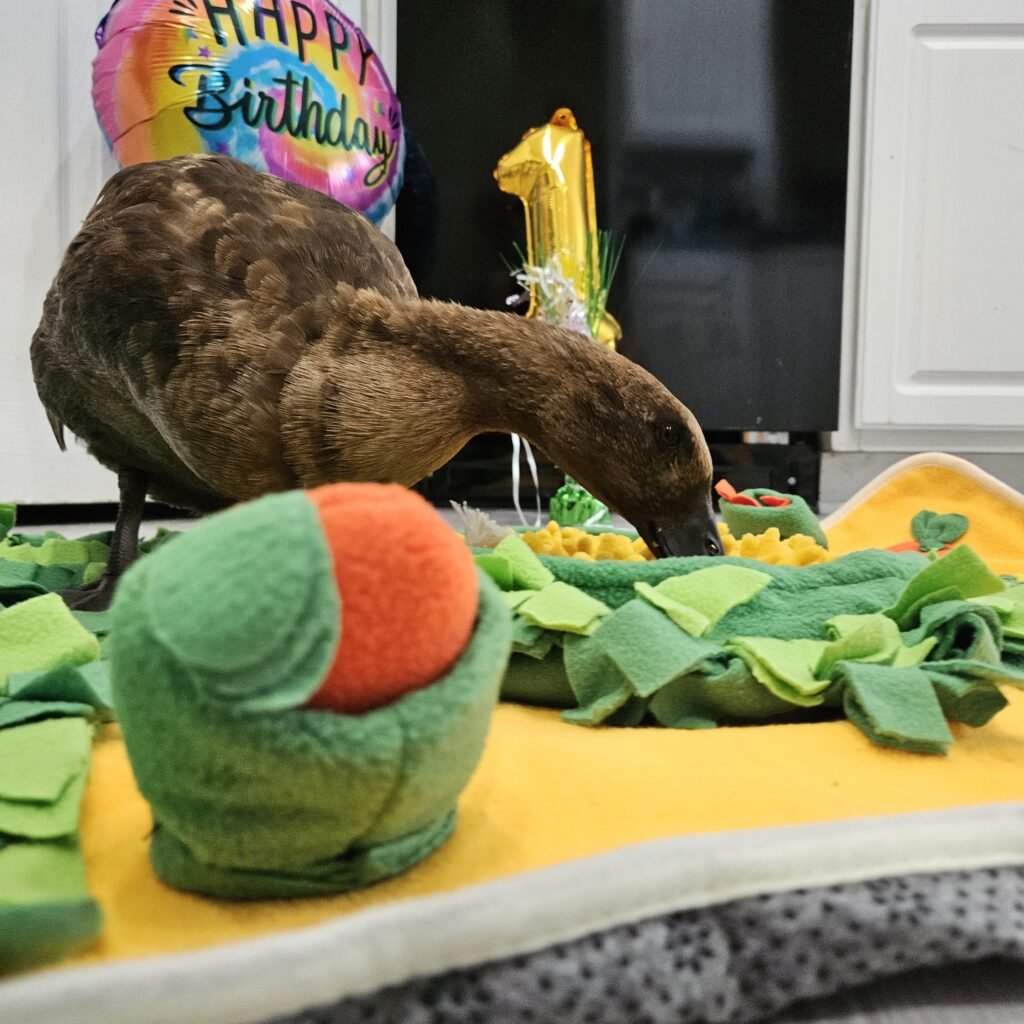
You can also create obstacle courses or agility challenges for your ducks to navigate for added mental and physical stimulation. Mimicking natural habitats and behaviors can help mentally and physically stimulate your ducks.
Provide opportunities for swimming and bathing in a shallow pond or kiddie pool, create digging areas filled with sand or soil, and offer hiding spots or shelters for nesting and resting. Incorporating natural elements into your ducks’ environment will help them lead happy and fulfilling lives.
If you are looking for some inspiration on what to get for your pet duck, read our post on 7 Must-Have Pet Duck Accessories.
Avian Veterinary Care
Regular veterinary care ensures your pet ducks’ health and well-being. Ducks are susceptible to illness, injury, and disease like all animals. A trusted avian veterinarian knowledgeable about duck care is essential for ensuring your ducks receive proper medical attention when needed. The Poultry DVM website provides a comprehensive directory of avian vets.
Schedule regular wellness exams for your ducks to monitor their overall health and detect any potential issues early on. Your veterinarian may recommend vaccinations against common diseases such as duck viral enteritis (DVE) or avian influenza (bird flu) based on your ducks’ risk factors and lifestyle. Be sure to follow your vet’s recommendations for preventive care to keep your ducks protected.
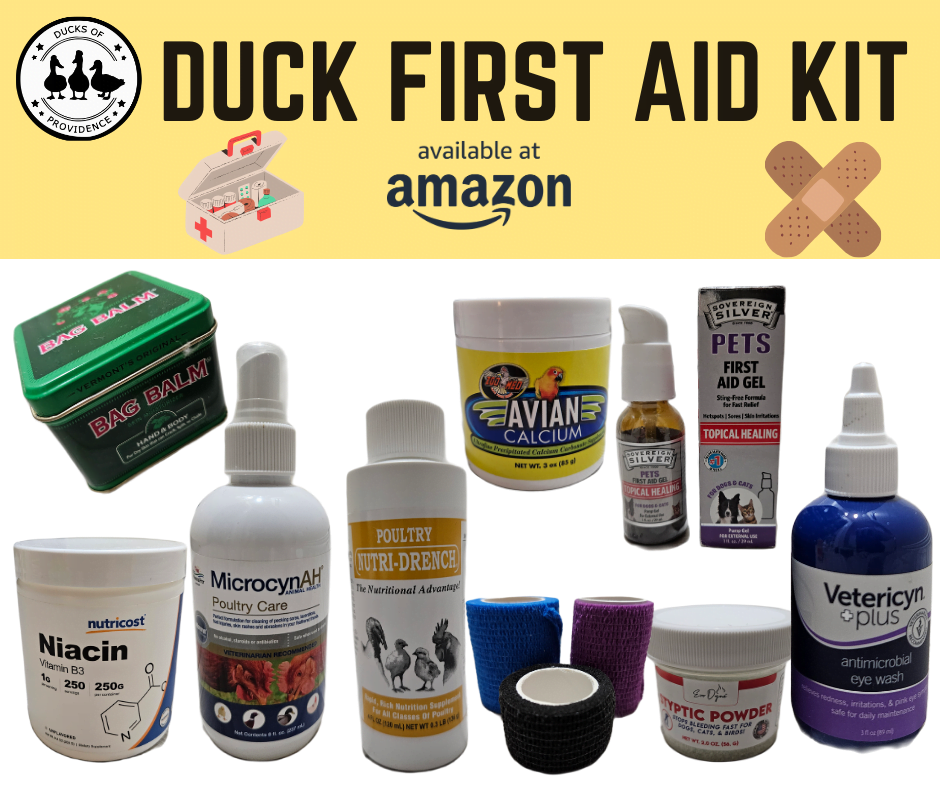
Duck First Aid Kit
Whether you’re an experienced duck keeper or just starting your quacking journey, having reliable first aid supplies on hand is essential. Don’t wait until an emergency strikes—be prepared and proactive in safeguarding the health of your feathered companions.
Despite your best efforts to keep your ducks safe and healthy, accidents and emergencies can still occur. It’s essential to be prepared to handle emergencies by having a first aid kit on hand and knowing how to administer basic first aid to your ducks. Learn how to recognize signs of distress or injury and be prepared to seek veterinary care if needed. We can also highly recommend getting a good book about duck care, like the Ultimate Pet Duck Guide Book.
Learn more about duck illnesses and how to treat them in the following posts:
- 29 Must-have Items for Your Pet Duck First Aid Kit
- 15 Common Duck Health Conditions You Should Know About
Indoor Duck Keeping and Diapers
While ducks are traditionally kept outdoors, there are circumstances where indoor duck keeping may be necessary or desirable. Indoor duckkeeping requires careful planning and consideration to meet your ducks’ needs.
Considerations for keeping ducks indoors include providing adequate space, ventilation, and access to natural light. Ducks are messy animals and produce a significant amount of waste, so it’s essential to have a plan for managing waste and keeping the living area clean.
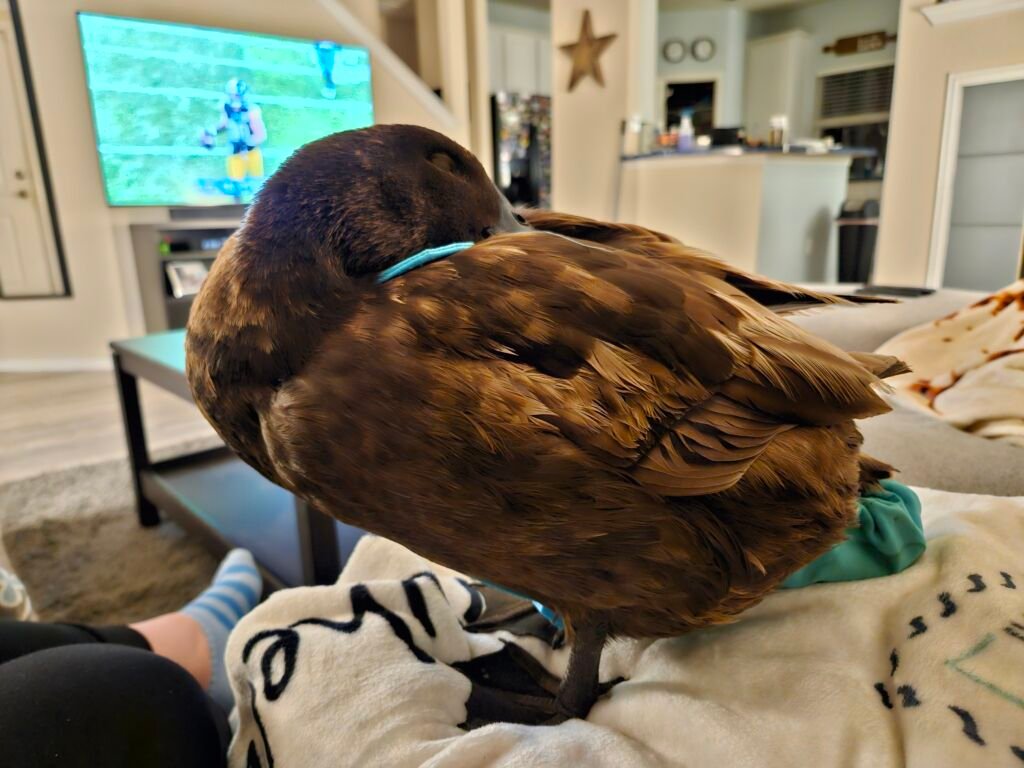
Duck diapers can be a valuable tool for indoor duckkeeping. They allow your ducks to roam freely indoors without making a mess. Diapers should be changed regularly, and ducks should be allowed frequent breaks outdoors for exercise and fresh air.
Balancing indoor and outdoor environments is essential for indoor duckkeeping. While ducks may enjoy spending time indoors with their human companions, they also need opportunities for outdoor exploration and natural behaviors. Providing a safe and secure outdoor space for your ducks to roam and forage will help meet their physical and psychological needs.
Learn more about Duck Diapers in the following posts:
- Duck Diapers Demystified: Answering Your Top 9 Questions
- DIY Duck Diapers: Keeping Your Duck Comfortable and Your House Clean
- Can You Keep Ducks Indoors as a House Pet?
The Importance of Flock Dynamics
Ducks are social animals that thrive in the company of their own kind. While it may be tempting to keep just one duck as a pet, it’s essential to understand that ducks are happiest and healthiest when they have companionship.
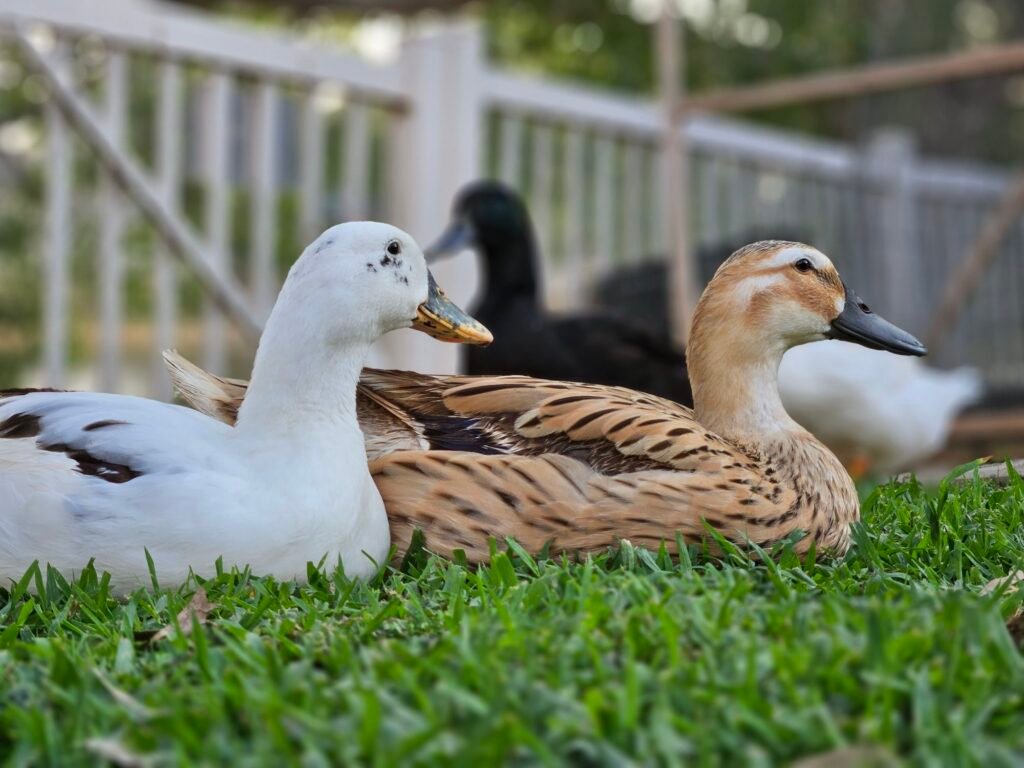
Keeping multiple ducks allows them to engage in natural flock behaviors, such as grooming, foraging, and socializing. Introducing new ducks to an existing flock should be done gradually and with care to minimize stress and conflict. Providing plenty of space, resources, and opportunities for interaction will help ensure a harmonious flock dynamic.
Read more about this topic in our related post: Pet Ducks: How Many should I have? And where do I get them from?
Where do I get my Pet Ducks From?
When considering where to get pet ducks, there are several options to explore:
- Hatcheries: Many hatcheries, such as Metzer Farms, specialize in hatching and selling ducklings of various breeds. You can often find reputable hatcheries online or locally that offer a wide selection of duck breeds to choose from.
- Local Farms or Breeders: Connecting with local farms or breeders who raise ducks can be a great way to find healthy, well-cared-for birds. Visiting the farm or breeder in person allows you to see the conditions in which the ducks are raised and select a bird that suits your preferences.
- Rescue Organizations: Rescue organizations and shelters occasionally have ducks available for adoption. Adopting a rescue organization gives you the opportunity to provide a loving home to a duck in need while also supporting animal welfare efforts.
- Feed Stores: Some feed stores sell ducklings during the spring and summer months. While convenient, it’s essential to ensure that the ducklings are healthy and that you’re prepared to care for them properly before making a purchase.
- Online Marketplaces: Websites and online marketplaces may have listings for ducklings or adult ducks available for sale or adoption. Exercise caution when purchasing online and ensure that the seller is reputable and adheres to proper animal welfare standards.
Regardless of where you choose to get your duck, it’s essential to research the seller, ask questions about the duck’s health and history, and ensure that you’re prepared to meet the needs of your new feathered friend. Remember that owning a duck is a long-term commitment, and providing proper care and attention is crucial for their well-being.
Read more about where to get ducks from in our post Pet Ducks: How Many should I have? And where do I get them from?
Is It Legal to Own a Pet Duck?
The legality of owning a pet duck varies depending on where you live and local regulations. In many areas, it is legal to keep ducks as pets, but there may be restrictions on the number of ducks you can own, housing requirements, and other regulations to ensure the well-being of the animals and the community.
Some cities and neighborhoods may have ordinances prohibiting the keeping of ducks or other poultry within city limits due to noise, waste, or zoning concerns. Before bringing home a pet duck, it’s essential to research and familiarize yourself with local laws and regulations governing animal ownership.
Additionally, obtaining any necessary permits or licenses and adhering to best practices for duck care can help ensure a positive experience for both you and your feathered friend.
Lifespan of Pet Ducks
It’s vital for anyone considering bringing a duck into their life to grasp the long-term commitment involved. Ducks aren’t just short-term pets; they’re companions that can be with you for 5 to 10 years or even longer with proper care.
Wild and domesticated ducks have a lifespan that can vary depending on the care they receive. Wild ducks typically enjoy a life span of 5 to 10 years, adapting to the challenges of their natural habitat. However, with dedicated care, pet ducks can thrive and surpass expectations, living up to 20 years. The key lies in providing proper care and a nurturing environment.
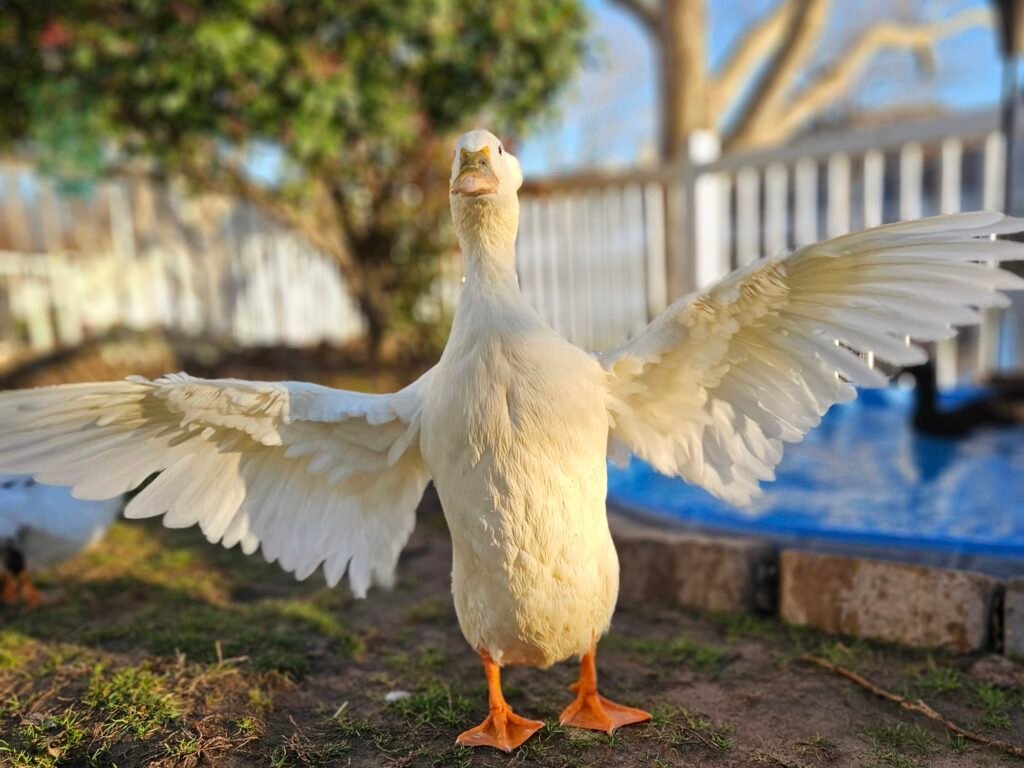
As prospective duck owners, it’s crucial to realize that caring for a duck means committing to their physical, emotional, and social needs throughout their lives. This encompasses providing suitable shelter, nutrition, veterinary care, and daily interaction.
Ducks form strong bonds with their human caregivers and thrive on companionship, requiring consistent attention and engagement. Before embarking on the journey of duck ownership, it’s essential to weigh the challenges and rewards and ensure you’re prepared to provide a loving and stable home for your duck for many years ahead.
➡️ Read more about the lifespan of ducks in our related post: How Long Do Ducks Live?
The Reality of Duck Ownership
Dispelling myths about ducks as easy pets is crucial for prospective duck owners. While ducks are charming and delightful companions, they are not low-maintenance pets. Ducks require daily care, attention, and a long-term commitment. From providing adequate shelter and nutrition to safeguarding against predators and providing mental stimulation, duck ownership requires dedication and responsibility.
Understanding the level of care and attention that ducks require before bringing them into your life is essential. Responsible ownership means meeting your ducks’ physical, emotional, and social needs for the duration of their lives.
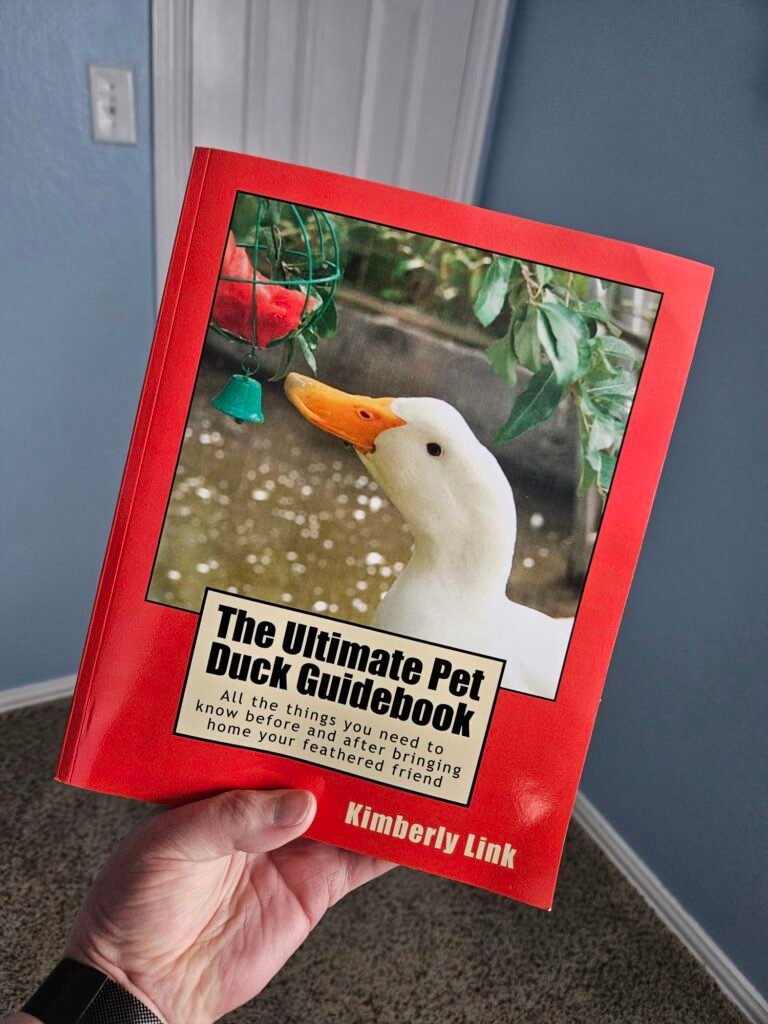
Pet Duck Guide
This is the BEST book about ducks I have ever had. I can highly recommend it to every duck owner, new or experienced. It is very comprehensive, with pictures and illustrations. It covers all topics related to duck care and keeping ducks. It even has multiple case studies.
Conclusion
Reflecting on the joys and challenges of duck ownership, it’s clear that keeping pet ducks is a rewarding and fulfilling experience. You can ensure a happy and healthy life for your feathered companions by providing proper care, attention, and enrichment. Empowering readers with knowledge and resources for successful duck care is essential for fostering responsible ownership and promoting the well-being of ducks everywhere. Whether you’re an experienced duck enthusiast or a novice duck owner, there’s always more to learn and explore in the world of duckkeeping. By approaching duck ownership with realistic expectations and dedication, you can embark on a quacking adventure filled with love, laughter, and endless joy.

Hi ducksofprovidence.com administrator, Thanks for the well-organized and comprehensive post!
thank you very much 🥰